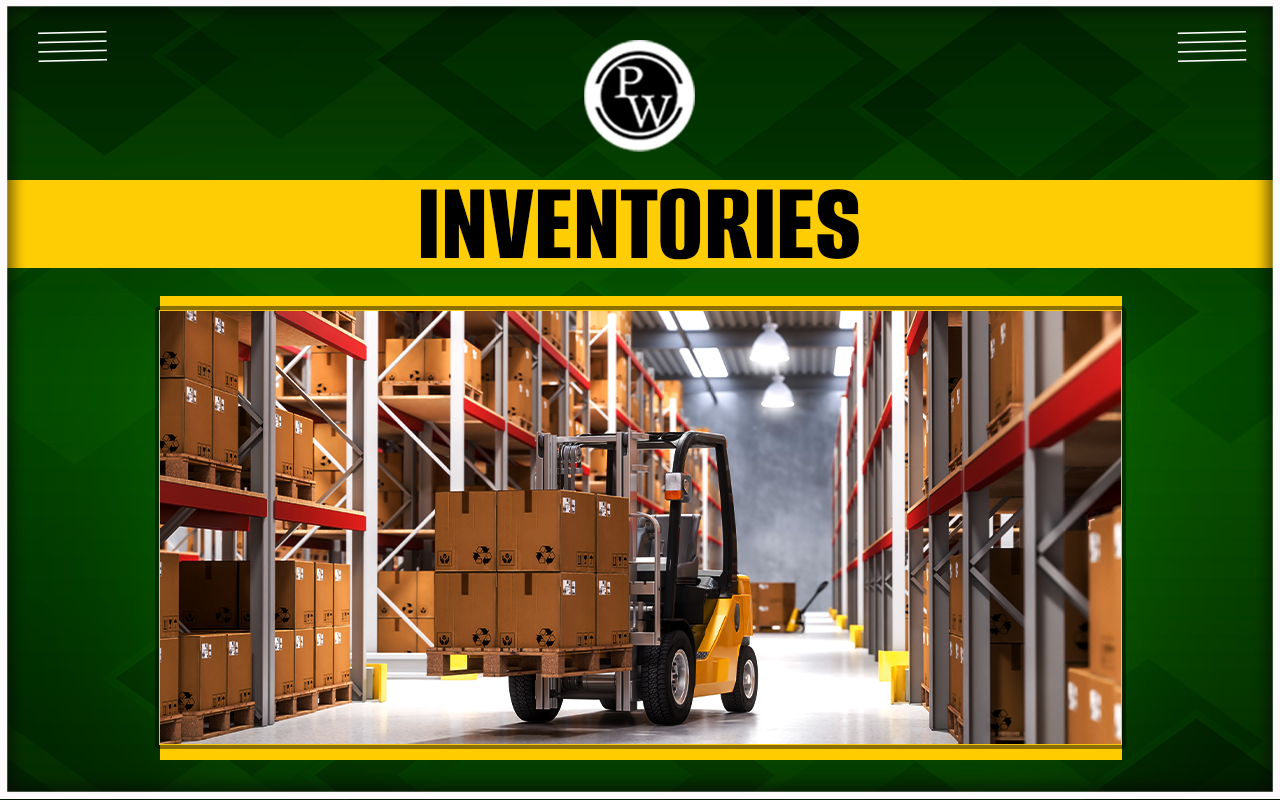

In every business, there are goods and materials kept in storage. These can include finished products, raw materials, or equipment. This collection of stored items is known as inventory. Let's delve into what inventory means and the different types of Inventories for CA Exams .
What Are Inventories?
Inventories are like a treasure chest for a company. It includes all the stuff a company owns that it plans to use or sell soon. This stuff can be finished products ready to be sold, raw materials waiting to be turned into products, or tools and spare parts needed for making things. There are three main reasons why a company keeps inventory: to sell it directly to customers, to use it in making products, or to use it during the manufacturing process. At the end of each year, the company makes a list of all the inventory it has. This helps figure out how much all that stuff is worth at the end of the year. This number is really important because it shows up on the company's financial reports, affecting how much they say they own and how much they've sold.Classification of Inventories
Inventories can be categorized into two main types: direct inventory and indirect inventory. Let's explore the differences between these classifications.Direct Inventories
Direct inventories are essential components of finished products. They are physical items directly incorporated into the final goods and can be assigned to specific units. Now, let's look at the different types of direct inventories:- Raw Materials: These are natural or basic materials used in manufacturing final products. For instance, sugarcane in a sugar factory or rubber in a tire factory. Companies keep stocks of raw materials to ensure uninterrupted production and benefit from economies of scale, although they need to consider storage costs.
- Semi-Finished Goods : Also known as work-in-progress, these items are partially completed. They require further processing before they can be sold. For example, toys that are molded but still need painting in a toy factory.
- Finished Goods: These are fully completed products ready for sale but have not yet been sold.
Indirect Inventories
Indirect inventories include items essential for manufacturing goods but are not directly part of those goods themselves. These are ancillary goods that cannot be attributed to specific final product units. These indirect inventories can be used in manufacturing, sales, distribution, or administrative functions. For instance, petrol or lubricants used in production are indirect inventories, while office supplies used for administrative purposes also fall into this category.Also Check: Difference Between Accounting and Financial Management
Inventory Valuation
Inventory valuation refers to assigning a monetary value to goods held in inventory at the end of an accounting period. This value is based on the costs incurred to acquire and prepare the inventory for sale. Inventories are among the largest current assets for businesses. Valuation helps owners assess the Cost of Goods Sold (COGS) and, consequently, profitability. The most commonly used methods for valuation include FIFO (first-in, first-out), LIFO (last-in, first-out), and WAC (weighted average cost). Inventory valuation is typically performed at the end of each financial year to determine the cost of goods sold and the value of unsold inventory.Inventory Days
Inventory Days, also known as Days Inventory Outstanding (DIO), are calculated using the formula:Inventory Days = 365/Inventory Turnover
This formula helps determine the number of days it takes for a company to convert its inventory into sales. A higher number of inventory days suggests slower inventory turnover, which could indicate internal or external issues affecting sales efficiency. It's an important metric for assessing operational efficiency and financial health.Inventory Accounting
Inventory accounting is all about how a company keeps track of and values its inventory. Inventory includes everything a company plans to sell to make money. Inventory accounting helps companies keep track of how much these different types of inventory are worth and how they change over time. This is important for knowing how much money a company has tied up in its products and for making sure they have enough inventory to meet customer demand. Enroll PW CA Courses today to master inventory accounting and more.| Also Check | |
| Public Finance and Budget | Inflation and Its Impact on Business |
| Common Accounting Mistakes | Economic Environment of Business |
| How to Read and Interpret Financial Statements? | GAAP vs. IFRS |
Inventories FAQs
What is inventory in accounting?
Inventory in accounting refers to the goods and materials that a business holds for production, resale, or use in its operations. It includes finished products ready for sale, raw materials for production, and other items like equipment and spare parts.
Why is inventory management important for businesses?
Effective inventory management ensures that businesses have enough stock to meet customer demand without overstocking, which ties up capital. It also helps in optimizing production schedules, managing cash flow, and meeting financial reporting requirements.
What are the methods used for inventory valuation?
The main methods for inventory valuation include FIFO (First-In, First-Out), LIFO (Last-In, First-Out), and WAC (Weighted Average Cost). These methods determine the cost of goods sold (COGS) and the value of remaining inventory on financial statements.
What is the difference between direct and indirect inventories?
Direct inventories are components used in finished products, such as raw materials and semi-finished goods. Indirect inventories, on the other hand, are essential for operations but do not become part of the final product, like maintenance supplies or office consumables.
How does inventory turnover affect a company's financial health?
Inventory turnover, calculated as the ratio of cost of goods sold to average inventory, measures how quickly a company sells and replaces its inventory. A higher turnover generally indicates efficient operations and better liquidity, whereas a lower turnover may suggest excess inventory or slow sales.
Talk to a counsellorHave doubts? Our support team will be happy to assist you!

Check out these Related Articles
Free Learning Resources
PW Books
Notes (Class 10-12)
PW Study Materials
Notes (Class 6-9)
Ncert Solutions
Govt Exams
Class 6th to 12th Online Courses
Govt Job Exams Courses
UPSC Coaching
Defence Exam Coaching
Gate Exam Coaching
Other Exams
Know about Physics Wallah
Physics Wallah is an Indian edtech platform that provides accessible & comprehensive learning experiences to students from Class 6th to postgraduate level. We also provide extensive NCERT solutions, sample paper, NEET, JEE Mains, BITSAT previous year papers & more such resources to students. Physics Wallah also caters to over 3.5 million registered students and over 78 lakh+ Youtube subscribers with 4.8 rating on its app.
We Stand Out because
We provide students with intensive courses with India’s qualified & experienced faculties & mentors. PW strives to make the learning experience comprehensive and accessible for students of all sections of society. We believe in empowering every single student who couldn't dream of a good career in engineering and medical field earlier.
Our Key Focus Areas
Physics Wallah's main focus is to make the learning experience as economical as possible for all students. With our affordable courses like Lakshya, Udaan and Arjuna and many others, we have been able to provide a platform for lakhs of aspirants. From providing Chemistry, Maths, Physics formula to giving e-books of eminent authors like RD Sharma, RS Aggarwal and Lakhmir Singh, PW focuses on every single student's need for preparation.
What Makes Us Different
Physics Wallah strives to develop a comprehensive pedagogical structure for students, where they get a state-of-the-art learning experience with study material and resources. Apart from catering students preparing for JEE Mains and NEET, PW also provides study material for each state board like Uttar Pradesh, Bihar, and others
Copyright © 2025 Physicswallah Limited All rights reserved.











